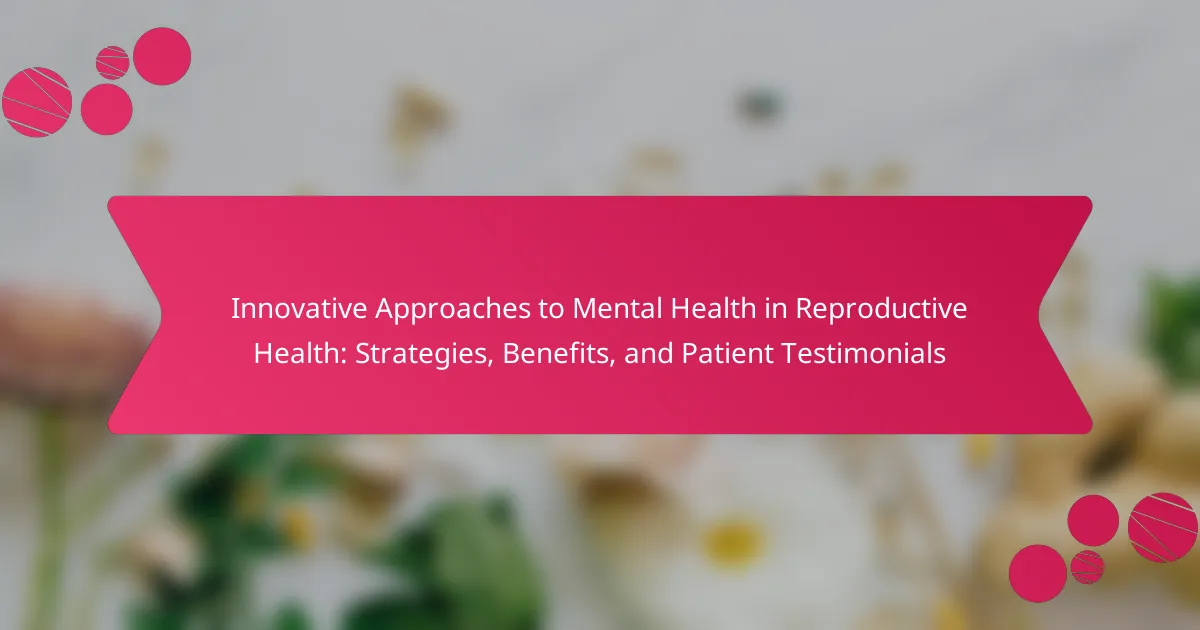Innovative approaches to mental health in reproductive health enhance emotional well-being and reduce anxiety. Key strategies include integrated care models, psychoeducation, and community support initiatives. These methods improve patient satisfaction and empower individuals during their reproductive journeys. Patient testimonials highlight the effectiveness of personalised care and the integration of technology in these practices.
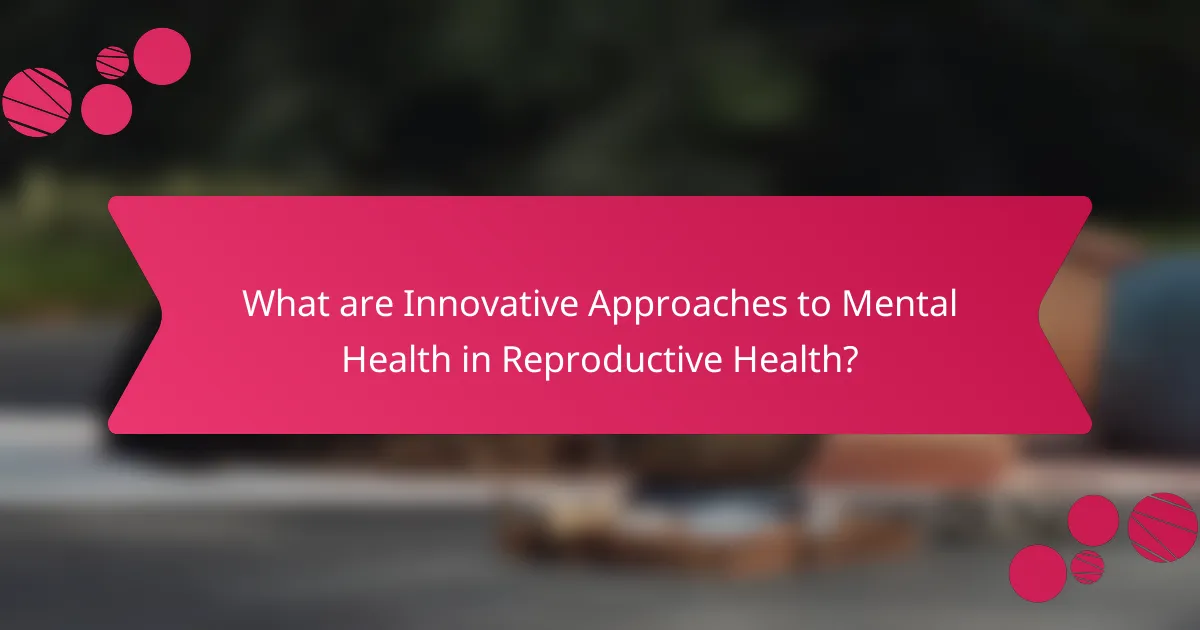
What are Innovative Approaches to Mental Health in Reproductive Health?
Innovative approaches to mental health in reproductive health focus on integrating psychological support into reproductive care. Strategies include teletherapy, group support sessions, and mindfulness training. These methods enhance emotional well-being, reduce anxiety, and improve patient satisfaction. Testimonials reveal that patients experience greater empowerment and connection through these innovative practices.
How do these approaches address common mental health challenges during reproductive events?
Innovative approaches effectively address common mental health challenges during reproductive events by providing tailored support and evidence-based strategies. These methods focus on enhancing emotional resilience, reducing anxiety, and fostering community connections. For example, cognitive-behavioural therapy and mindfulness practices have shown significant benefits in managing stress related to pregnancy and postpartum experiences. Patient testimonials highlight improved mental well-being and satisfaction with care when utilising these innovative strategies.
Which populations benefit most from these innovative strategies?
Populations that benefit most from innovative mental health strategies in reproductive health include adolescents, pregnant individuals, postpartum women, and those with pre-existing mental health conditions. These groups often face unique challenges and can experience significant improvements through tailored interventions. For example, adolescents may gain coping skills, while pregnant individuals can receive support for anxiety and depression.
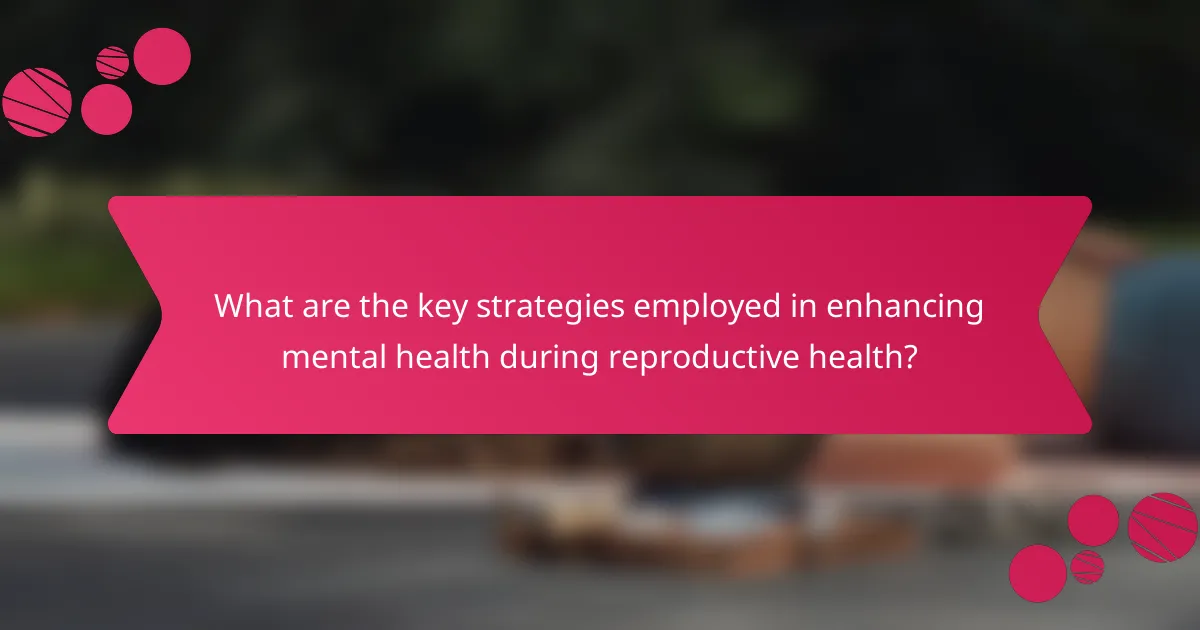
What are the key strategies employed in enhancing mental health during reproductive health?
Key strategies for enhancing mental health during reproductive health include integrated care models, psychoeducation, and community support initiatives. Integrated care combines physical and mental health services, promoting a holistic approach. Psychoeducation equips patients with knowledge about mental health challenges, fostering resilience. Community support initiatives create networks for shared experiences, reducing stigma and isolation. These strategies improve overall well-being and patient satisfaction, as evidenced by numerous testimonials.
How do integrated care models improve patient outcomes?
Integrated care models significantly enhance patient outcomes by offering coordinated mental health support within reproductive health services. These models facilitate comprehensive treatment, addressing both mental and physical health needs simultaneously.
For example, integrated care leads to improved patient satisfaction and engagement, as providers work collaboratively to create personalised care plans. Studies show that patients receiving integrated care experience reduced symptoms of anxiety and depression, enhancing overall reproductive health outcomes.
Additionally, testimonials highlight the positive impact of these models, with patients reporting greater emotional support and access to resources. By fostering a holistic approach, integrated care models effectively improve the quality of care for individuals navigating reproductive health challenges.
What role does telehealth play in mental health support for reproductive health?
Telehealth significantly enhances mental health support for reproductive health by providing accessible, timely care. It allows patients to connect with mental health professionals without geographical barriers, ensuring they receive necessary support during critical reproductive health phases. Telehealth services can include therapy, counselling, and medication management tailored to individual needs, promoting mental well-being. Research indicates that telehealth can improve patient engagement and satisfaction, leading to better health outcomes. Additionally, patient testimonials highlight the convenience and comfort of receiving mental health support from home, reducing stigma and increasing access to care.
How can community-based interventions enhance mental well-being?
Community-based interventions significantly enhance mental well-being by fostering social connections and support networks. These strategies create inclusive environments that reduce stigma and promote open dialogue about mental health. For instance, community programmes offer workshops and peer support groups, which have shown to improve individuals’ coping mechanisms and resilience.
Additionally, research indicates that such interventions lead to a measurable decrease in anxiety and depression rates among participants. Patient testimonials often highlight personal growth and improved relationships as key benefits. Overall, these innovative approaches empower individuals and strengthen community ties, ultimately enhancing mental health outcomes.
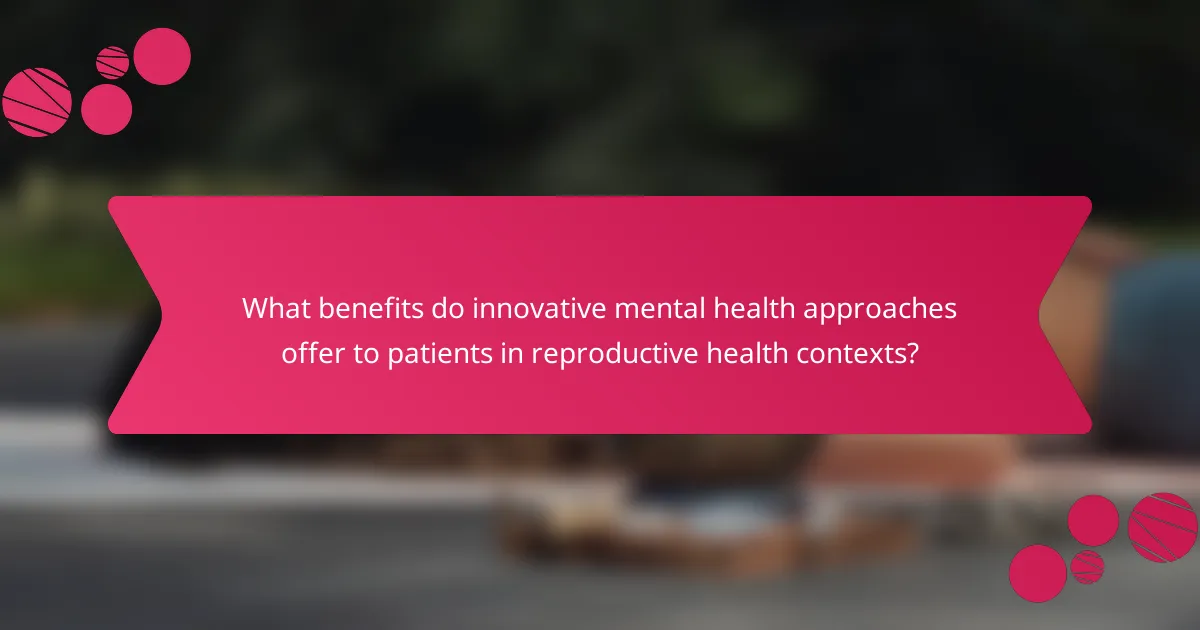
What benefits do innovative mental health approaches offer to patients in reproductive health contexts?
Innovative mental health approaches enhance reproductive health by providing personalised care, reducing anxiety, and improving emotional well-being. These strategies often integrate mindfulness, cognitive behavioural therapy, and peer support. As a result, patients report feeling more empowered and supported during their reproductive journeys. Testimonials highlight increased resilience and better coping mechanisms, demonstrating the effectiveness of these innovative methods.
How do these strategies improve overall reproductive health outcomes?
Innovative strategies enhance reproductive health outcomes by integrating mental health support, leading to improved emotional well-being and reduced stress. These approaches foster a holistic understanding of patient needs, which can enhance communication and trust between patients and healthcare providers. For instance, mindfulness practices have been shown to decrease anxiety levels in expectant mothers, positively impacting fetal development. Additionally, patient testimonials highlight increased satisfaction and engagement in care, resulting in better adherence to treatment plans. Overall, these strategies create a more supportive environment that addresses both mental and reproductive health, ultimately improving patient outcomes.
What psychological benefits are reported by patients utilising these approaches?
Patients utilising innovative approaches to mental health in reproductive health report significant psychological benefits. These include reduced anxiety, enhanced emotional resilience, and improved self-esteem. Additionally, many experience a greater sense of control over their reproductive health, leading to increased overall well-being. Testimonials indicate that these strategies foster a supportive community, which further alleviates feelings of isolation and enhances coping mechanisms.
Which long-term benefits have been observed in mental health from these strategies?
Long-term benefits from innovative mental health strategies in reproductive health include improved emotional resilience, enhanced coping mechanisms, and reduced anxiety levels. These approaches foster a supportive environment, leading to sustained positive mental well-being. For instance, patient testimonials highlight increased self-awareness and stronger relationships as key outcomes. Regular engagement with these strategies promotes lasting mental health improvements, creating a foundation for overall wellness.
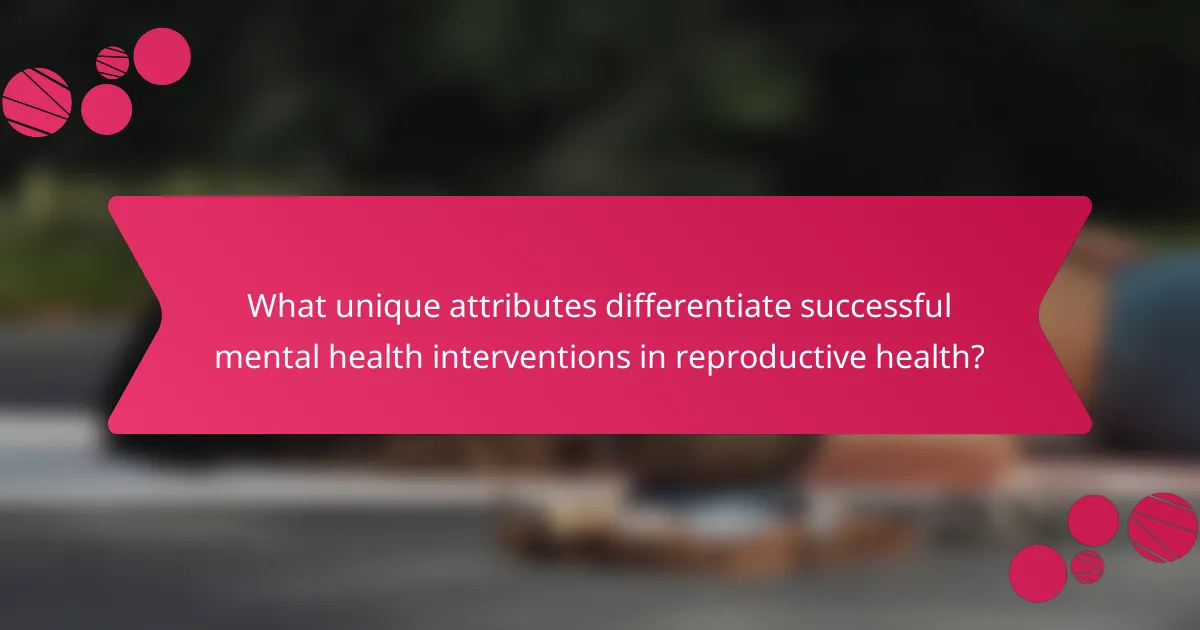
What unique attributes differentiate successful mental health interventions in reproductive health?
Unique attributes that differentiate successful mental health interventions in reproductive health include tailored approaches, integration of technology, and cultural sensitivity. Tailored approaches address individual needs, enhancing engagement and effectiveness. Integration of technology, such as teletherapy and apps, increases accessibility and convenience. Cultural sensitivity ensures interventions resonate with diverse populations, improving trust and outcomes. These attributes contribute to the overall success of mental health strategies in reproductive health contexts.
How do cultural considerations shape the effectiveness of these interventions?
Cultural considerations significantly enhance the effectiveness of mental health interventions in reproductive health. Tailoring strategies to align with cultural values fosters trust, improves engagement, and leads to better outcomes. For instance, integrating traditional practices can resonate more with patients, making them more receptive to innovative approaches. Understanding cultural nuances also helps in addressing stigma associated with mental health, allowing for more open discussions and support.
What innovative technologies are leading the way in mental health support?
Innovative technologies in mental health support include teletherapy, AI-driven chatbots, and virtual reality therapy. These approaches enhance accessibility, provide personalised care, and improve patient engagement. Teletherapy allows patients to connect with therapists remotely, breaking geographical barriers. AI chatbots offer 24/7 support and can assist with symptom tracking. Virtual reality creates immersive experiences for exposure therapy, helping patients confront fears in a controlled environment. Each of these technologies contributes to improved mental health outcomes, making support more effective and user-friendly.
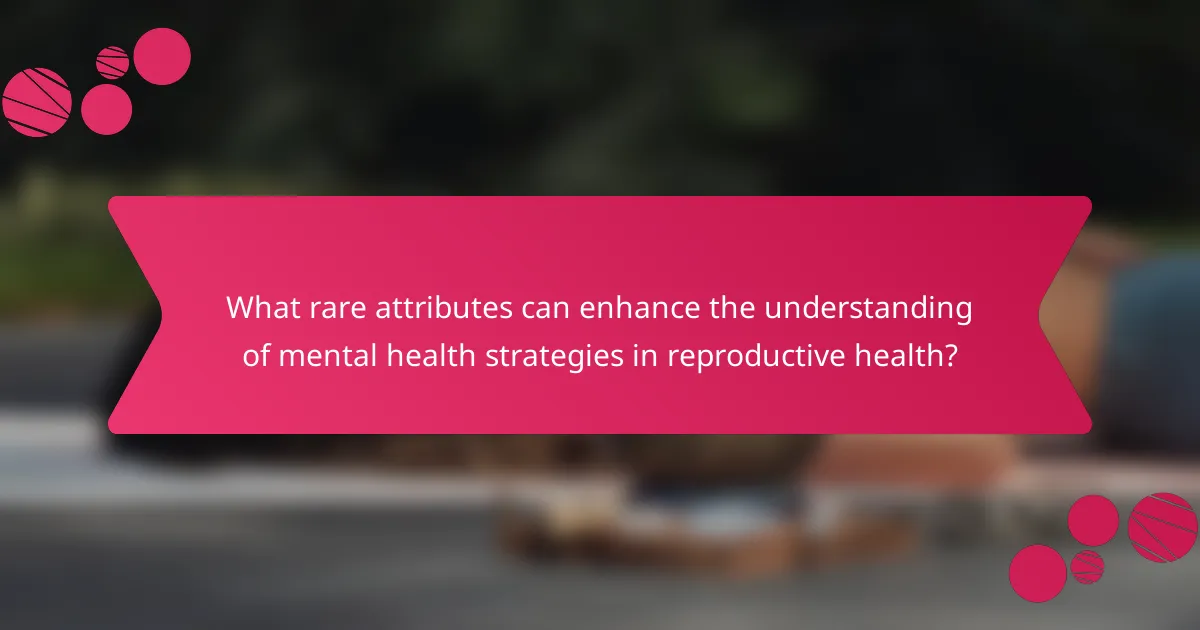
What rare attributes can enhance the understanding of mental health strategies in reproductive health?
Rare attributes that can enhance understanding of mental health strategies in reproductive health include culturally specific practices, innovative digital tools, and interdisciplinary collaboration. Culturally specific practices address unique community needs, improving engagement and effectiveness. Innovative digital tools, such as mobile apps, provide personalised support and resources. Interdisciplinary collaboration fosters a holistic approach, integrating insights from psychology, obstetrics, and social work, leading to comprehensive care. These rare attributes contribute to more effective mental health strategies in reproductive health.
How do personalised care plans impact patient satisfaction?
Personalised care plans significantly enhance patient satisfaction by addressing individual needs. Tailored strategies in mental health for reproductive health lead to better outcomes and increased engagement. Patients report feeling more understood and supported, which fosters trust in healthcare providers. This approach can improve adherence to treatment and overall mental well-being.
What uncommon therapies have shown promise in specific patient groups?
Innovative therapies like art therapy, mindfulness-based stress reduction, and animal-assisted therapy have shown promise in specific patient groups. These approaches can enhance emotional well-being and reduce anxiety during reproductive health challenges. For instance, art therapy allows patients to express feelings creatively, which can be particularly beneficial for those facing infertility or pregnancy loss. Mindfulness techniques help manage stress and improve coping mechanisms, while animal-assisted therapy provides comfort and companionship, fostering a sense of connection. Each of these therapies addresses unique needs, offering tailored support in reproductive mental health.
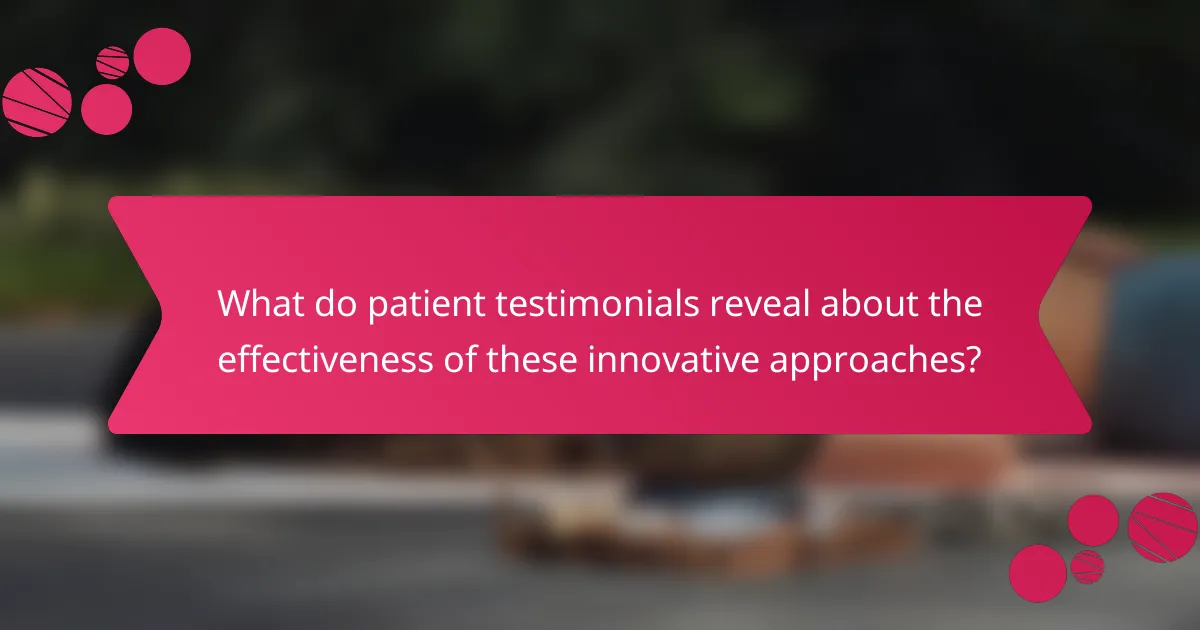
What do patient testimonials reveal about the effectiveness of these innovative approaches?
Patient testimonials indicate that innovative approaches to mental health in reproductive health significantly improve emotional well-being. Many patients report enhanced coping strategies and reduced anxiety levels. For instance, therapies integrating mindfulness and cognitive behavioural techniques have received positive feedback for their effectiveness. Testimonials often highlight personalised care as a key factor in achieving successful outcomes. Overall, these approaches foster a supportive environment that encourages healing and empowerment.
How do personal stories highlight the emotional impact of mental health interventions?
Personal stories effectively illustrate the emotional impact of mental health interventions by showcasing real-life experiences. These narratives create a powerful connection, allowing individuals to relate to the challenges and triumphs of others. For instance, testimonials reveal how innovative approaches in reproductive health, such as therapy and support groups, have positively transformed lives. They highlight benefits like improved emotional well-being and enhanced coping strategies. Such personal accounts often emphasize the importance of tailored interventions, demonstrating their unique ability to resonate with diverse patient needs.
What common themes emerge from patient experiences with these strategies?
Common themes from patient experiences with innovative mental health strategies in reproductive health include increased emotional resilience, improved communication with healthcare providers, and enhanced coping mechanisms. Patients often report feeling more empowered in their reproductive choices, leading to greater satisfaction with their overall health. Testimonials highlight the importance of personalised care and the positive impact of community support. Many patients emphasize the role of education in reducing anxiety and fostering a better understanding of their mental health needs.
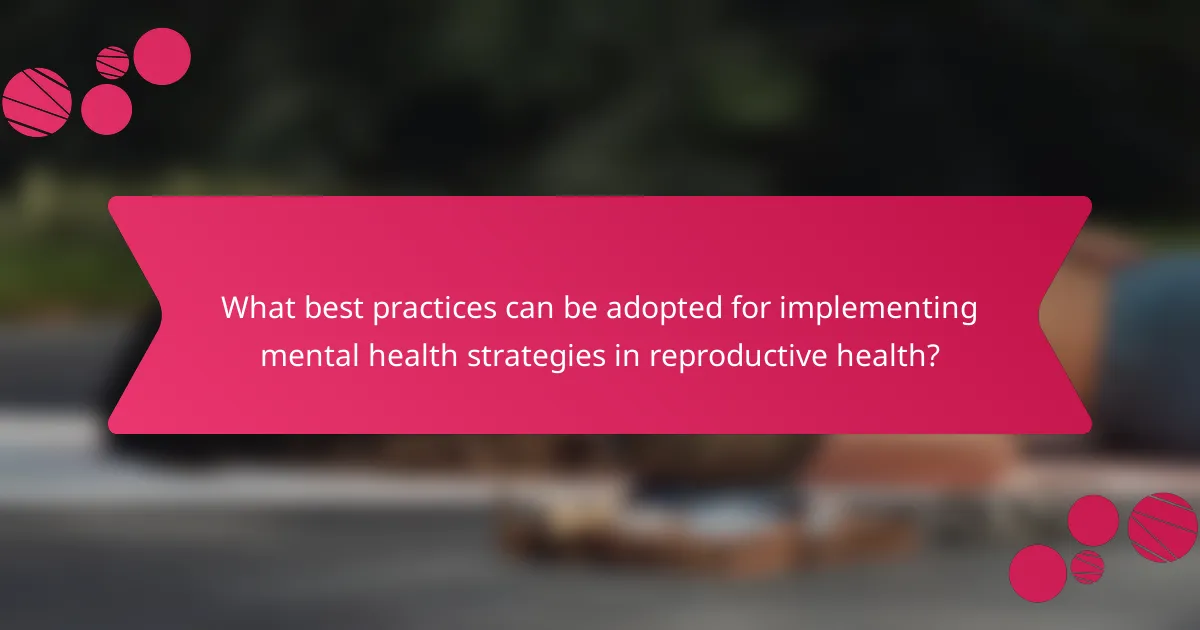
What best practices can be adopted for implementing mental health strategies in reproductive health?
Adopting best practices for mental health strategies in reproductive health includes integrating holistic care, training staff, and ensuring patient-centred approaches. Emphasising mental health enhances overall reproductive health outcomes and patient satisfaction.
1. Implement routine mental health screenings during reproductive health visits.
2. Train healthcare providers on mental health awareness and support techniques.
3. Foster a collaborative environment between mental health professionals and reproductive health providers.
4. Provide educational resources to patients about mental health and reproductive health connections.
5. Encourage open communication between patients and providers regarding mental health concerns.
6. Utilise telehealth services to improve access to mental health support for reproductive health patients.
How can healthcare providers enhance patient engagement in mental health programs?
Healthcare providers can enhance patient engagement in mental health programs through personalised care, technology integration, and community support. Personalised care involves tailoring treatment plans to individual needs, improving satisfaction and outcomes. Technology integration, such as telehealth and mobile apps, facilitates access and fosters continuous communication. Community support initiatives create a sense of belonging and encourage participation in programs. These strategies collectively enhance patient involvement and promote better mental health outcomes.
What common mistakes should be avoided when integrating mental health support?
Common mistakes to avoid when integrating mental health support include neglecting patient feedback, overlooking cultural sensitivities, and failing to provide ongoing training for staff. These errors can hinder effective support and lead to poor patient outcomes. Prioritising a patient-centred approach ensures that services align with individual needs and preferences. Additionally, addressing stigma and promoting open communication fosters a supportive environment, enhancing overall mental health integration in reproductive health.
Which metrics should be monitored to evaluate the success of these interventions?
To evaluate the success of innovative mental health interventions in reproductive health, monitor engagement, patient outcomes, and satisfaction. Key metrics include the number of participants, improvement in mental health scores, and feedback from testimonials.
| Metric | Description |
|—————————-|——————————————————–|
| Participant Engagement | Number of individuals participating in interventions |
| Mental Health Improvement | Changes in standardised mental health assessment scores|
| Patient Satisfaction | Feedback ratings from patient testimonials |
| Follow-up Retention Rate | Percentage of participants completing follow-up sessions|
| Referral Rates | Number of new patients referred by existing participants|
| Intervention Cost-Effectiveness | Analysis of costs versus benefits of interventions |
